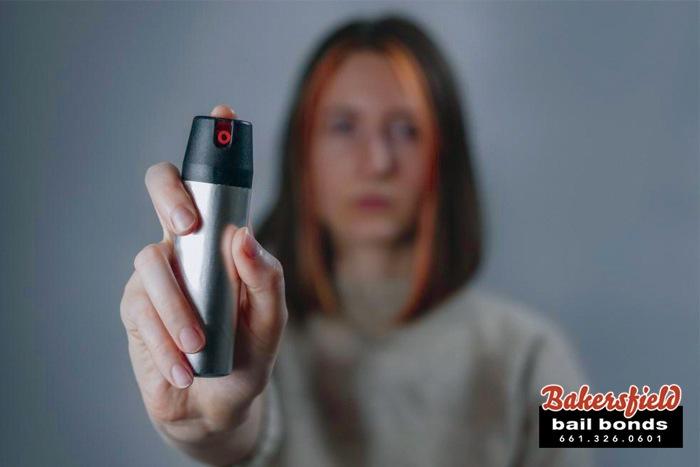Table of Contents
- Felons and Pepper Spray Ownership: Understanding Legal Restrictions
- State-by-State Variations in Pepper Spray Laws for Felons
- Navigating Federal Regulations and Felon Firearm Alternatives
- Practical Steps for Felons to Obtain Pepper Spray Legally
- In Summary
Felons and Pepper Spray Ownership: Understanding Legal Restrictions
For individuals with felony convictions, the ability to legally possess pepper spray varies significantly depending on state and local laws. While pepper spray is generally considered a self-defense tool, some jurisdictions impose strict limitations on felons, often treating it much like a firearm or other controlled weapon. It’s crucial to understand that these restrictions are not uniform; some states allow felons to carry pepper spray without restrictions, whereas others prohibit possession outright or require special permits. Violating these rules can result in additional legal penalties, including fines or criminal charges.
Key factors influencing the legality include:
- State-specific legislation: Laws governing pepper spray possession by felons can differ widely from one state to another.
- Type and strength of pepper spray: Some jurisdictions allow felons to own pepper spray only if it meets certain strength or formulation standards.
- Purpose of use: Demonstrating a legitimate need for self-defense can impact the permissibility of ownership.
- Background checks and permits: In certain areas, felons may obtain restrictions-lifting permits after thorough background scrutiny.
State-by-State Variations in Pepper Spray Laws for Felons
When it comes to felons owning pepper spray, there is no one-size-fits-all rule across the United States. Each state has its own set of restrictions and allowances that can vary dramatically. Some states impose complete prohibitions on felons possessing pepper spray, citing concerns over public safety and recidivism. Others take a more lenient approach, permitting use under certain conditions, such as obtaining a permit or only allowing usage for self-defense purposes. This patchwork of laws means that felons must be extremely diligent in understanding their own state’s regulations before acquiring or carrying pepper spray.
Here’s what felons should consider when examining state laws:
- Licensing requirements: Some states require felons to apply for a license or permit specifically to carry pepper spray.
- Type and concentration restrictions: Pepper spray formulas allowed for civilians can differ-felons might face stricter limits or be barred from carrying higher-concentration sprays.
- Variability in definitions: In certain states, pepper spray may be categorized alongside other defensive weapons, affecting accessibility for felons.
Understanding these distinctions is crucial, as violating local pepper spray laws can lead to serious legal consequences, including further felony charges. Always consult local statutes or seek legal guidance to ensure full compliance and safety.
Navigating Federal Regulations and Felon Firearm Alternatives
Understanding the intricacies of federal laws regarding firearms and other self-defense tools is crucial for individuals with felony convictions. The Gun Control Act of 1968 explicitly prohibits felons from owning, possessing, or purchasing firearms and ammunition. However, this strict regulation doesn’t automatically extend to every self-defense product on the market. For instance, many states draw a clear legal distinction between firearms and less-lethal devices such as pepper spray, providing a potential avenue for felons seeking lawful protection options. It’s essential for felons to familiarize themselves with both federal restrictions and state-specific nuances to avoid inadvertent legal violations.
When exploring alternatives to firearms, several options are available that often meet legal scrutiny more favorably. These include:
- Pepper spray or OC sprays: Often regulated separately from firearms, with purchase and possession typically allowed under certain conditions.
- Tasers and stun guns: Subject to varying state-level restrictions but generally permitted in many jurisdictions for self-defense.
- Personal alarms and whistles: Non-violent tools that can attract attention and deter attackers.
Felons should always verify local statutes and may consider consulting a legal expert before acquiring any self-defense tools to ensure full compliance with the law and avoid further complications.
Practical Steps for Felons to Obtain Pepper Spray Legally
For felons interested in owning pepper spray legally, the first and most important step is to thoroughly research state and local regulations, as laws vary widely across the U.S. In many jurisdictions, felons are outright prohibited from purchasing or possessing pepper spray; however, some states allow ownership with specific restrictions or after a certain period has passed post-conviction. Consulting with a legal professional can provide personalized guidance tailored to your location and criminal record. It’s also crucial to keep documentation of any permissions or licenses acquired to avoid inadvertent legal issues.
Once legality is confirmed, felons should take the following practical steps to ensure compliance and safety:
- Purchase only from reputable and licensed vendors: Avoid black-market or unregulated sellers to ensure the product meets legal standards.
- Choose the correct type and strength: Many regions limit the concentration or size of pepper spray canisters, so select accordingly.
- Keep your legal documentation accessible: Carry proof of eligibility or permits when possessing pepper spray.
- Register the product if required: Some states require formal registration with law enforcement or a governing body.
- Follow all storage and use regulations strictly: Misuse could result in criminal charges or loss of legal rights.
In Summary
In summary, the question of whether felons can legally own pepper spray is both complex and highly dependent on jurisdiction. While some states impose strict restrictions or outright bans, others may allow possession under specific conditions. It’s crucial for individuals with a felony conviction to thoroughly research their local laws and consult legal professionals if needed before acquiring pepper spray. Staying informed not only helps ensure compliance with the law but also promotes personal safety within the boundaries of legal rights. Remember, when it comes to self-defense tools like pepper spray, understanding the regulations is just as important as knowing how to use them responsibly.Check Our Other Blogs
- StunGun – Your Trusted Source for Stun Guns, Laws, and Self-Defense Tips
- PepperSprayLaws – Your Trusted Resource for Pepper Spray Information
- StunGunLaws – Your Trusted Guide to Stun Gun Legality and Safety




